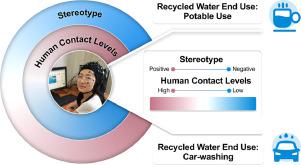Resources, Conservation and Recycling ( IF 13.2 ) Pub Date : 2021-02-05 , DOI: 10.1016/j.resconrec.2021.105464 Caixia Hou , Yan Wen , Yuqi He , Xiaojun Liu , Mengmeng Wang , Zhiyin Zhang , Hanliang Fu

|
Recycled water is an effective way to ease regional water resource shortages and promote environmental protection. The public is a direct user of recycled water, so their attitudes and acceptances are key links in the implementation of recycled water reuse projects. However, in the practical process of the implementation of recycled water reuse projects, the concept is frequently rejected by the public because of the negative perception that it is sourced from sewage. To gain a deeper understanding of this negative perception, this study attempts to take a cognitive neuroscience approach for assessing the stereotypes of recycled water end uses with different human contacts based on a temporal analysis of event-related potentials (ERP) and decision-making data. The results are as follows. First, in general, the stereotypes of recycled water reuse are deeply rooted among the public and are significantly negative. Second, compared with recycled water for car-washing, descriptions of recycled water for potable use with positive adjectives could evoke more significant N400 responses. In other words, the public perceive that recycled water for potable use is harmful, dangerous, and disgusting. Third, for recycled water with different levels of human contact, the negative stereotypes vary greatly. With increasing human contact levels, negative stereotypes will be increasingly enhanced. This study can provide scientific references for the promotion of recycled water end-use projects and optimal allocation of water resources.
中文翻译:

与人类不同接触的循环水最终用途的公共定型观念:来自与事件相关的潜力的证据(ERP)
再生水是缓解区域水资源短缺和促进环境保护的有效途径。公众是循环水的直接用户,因此他们的态度和接受度是实施循环水回用项目的关键环节。然而,在实施循环水回用项目的实际过程中,由于人们对这种概念源自污水而产生了负面看法,因此该概念经常被公众拒绝。为了更深入地了解这种负面看法,本研究尝试采用认知神经科学方法,基于对事件相关电位(ERP)和决策数据的时间分析,评估与不同人类接触的循环水最终用途的刻板印象。 。结果如下。首先,通常 循环水回用的刻板印象在公众中根深蒂固,并且是负面的。其次,与用于洗车的循环水相比,对带有阳性形容词的饮用水循环使用的描述可能会引起更重要的N400响应。换句话说,公众认为用于饮用水的循环水有害,危险且令人恶心。第三,对于人类接触程度不同的循环水,负面定型观念差异很大。随着人类接触水平的提高,负面刻板印象将越来越多。该研究可为促进循环水最终利用项目和优化水资源配置提供科学依据。对带有阳性形容词的饮用水进行再利用的描述可能会引起更重要的N400响应。换句话说,公众认为用于饮用水的循环水有害,危险且令人恶心。第三,对于人类接触程度不同的循环水,负面定型观念差异很大。随着人类接触水平的提高,负面刻板印象将越来越多。该研究可为促进循环水最终利用项目和优化水资源配置提供科学依据。对带有阳性形容词的饮用水进行再利用的描述可能会引起更重要的N400响应。换句话说,公众认为用于饮用水的循环水有害,危险且令人恶心。第三,对于人类接触程度不同的循环水,负面定型观念差异很大。随着人类接触水平的提高,负面刻板印象将越来越多。该研究可为促进循环水最终利用项目和优化水资源配置提供科学依据。负面定型观念差异很大。随着人类接触水平的提高,负面刻板印象将越来越多。该研究可为促进循环水最终利用项目和优化水资源配置提供科学依据。负面定型观念差异很大。随着人类接触水平的提高,负面刻板印象将越来越多。该研究可为促进循环水最终利用项目和优化水资源配置提供科学依据。



























 京公网安备 11010802027423号
京公网安备 11010802027423号